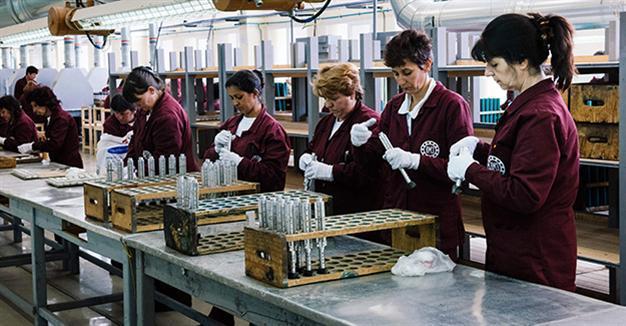Guns, not roses: Conflicts fire up Bulgaria arms trade
IGANOVO - Agence France-Presse

Spiraling conflicts in Syria and the Middle East have sparked a flurry of activity in Bulgarian arms factories not seen since communism collapsed.
The small EU member specializes in the production of affordable, lightweight Soviet-style weapons.
While main customers include governments in Afghanistan and Iraq, the arms have also found their way into the hands of opposition fighters in Syria’s bloody civil war.
At one of the country’s factories, hundreds of kilometers from Damascus, in a region known for its cultivation of roses, workers expertly assemble grenades for RPG-7 rocket-propelled launchers on a conveyor belt. “The orders are exceeding our capacity,” Ivan Getsov, director of the VMZ Sopot plant in the south-central village of Iganovo, told AFP.
“We produced as much in the first quarter of 2016 as in an entire year and a half previously,” he said.
The boom, which started a year and a half ago, “is driven by the conflicts in Syria and Iraq,” Bulgarian security expert Tihomir Bezlov said.
More specifically, it coincided with an escalation in the Syrian conflict in 2014 when major world powers became involved, either supporting or opposing President Bashar al-Assad in his fight against rebel groups.
Last June, the United States was forced to admit that it was equipping Syrian rebels, after an American defense contractor died in a blast at an arms testing range in Bulgaria.
Meanwhile, Saudi Arabia - another big Bulgarian customer - has also acknowledged supplying weapons to anti-Assad groups.
Riyadh signed a big Bulgarian arms deal in 2014. Analysts say it is unlikely that Saudi Arabia would buy these weapons for its own military, which uses modern arms.
“The Saudi military generally, but not exclusively, uses Western, rather than Eastern bloc weapons,” said Jeremy Binnie, the Middle East editor of Jane’s Defence Weekly magazine.
In addition, evidence retrieved on the ground shows that large quantities of Bulgarian weaponry have ended up in the possession of the Islamic State of Iraq and the Levant (ISIL).
Of 161 cartridges used by the jihadists, 47 had been made in Bulgaria, according to Conflict Armament Research, a British non-governmental group monitoring the movement of weapons and ammunition globally. At VMZ, two workers wearing protective gear carefully handle gunpowder cartridges inside a special armored booth. It is a dangerous job: earlier this year, three people died in two separate explosions at its Arsenal factory in the neighbouring town of Kazanlak.
Some of the employees sport face masks against the acrid chemical smell filling the factory, nestled at the foot of the Balkan mountains. VMZ, Bulgaria’s only remaining state-owned arms firm, recently expanded its premises and has gone on a massive recruitment drive for the first time in three decades.
 Spiraling conflicts in Syria and the Middle East have sparked a flurry of activity in Bulgarian arms factories not seen since communism collapsed.
Spiraling conflicts in Syria and the Middle East have sparked a flurry of activity in Bulgarian arms factories not seen since communism collapsed.